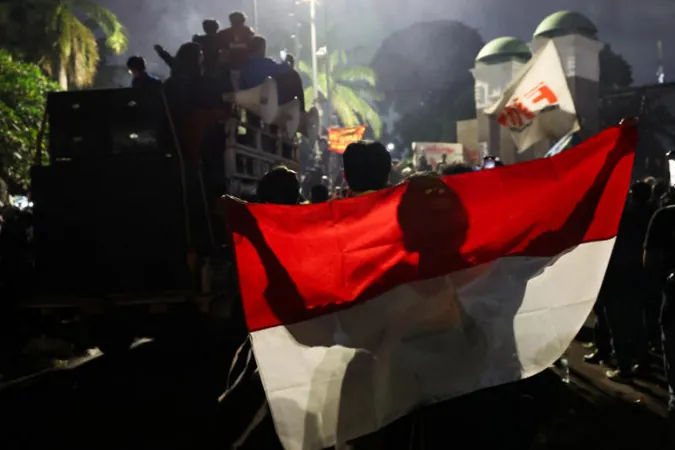
Investor Revolt Shakes Indonesia as President Prabowo Subianto's Economic Policies Face Scrutiny
2025-03-21
Author: Arjun
Investor Revolt Shakes Indonesia as President Prabowo Subianto's Economic Policies Face Scrutiny
In a shocking turn of events, Indonesia's financial markets are reacting like never before to President Prabowo Subianto's controversial economic initiatives. After months of concern regarding his populist policies and attempts to undermine the independence of the central bank, investor frustration has reached a boiling point, culminating in a dramatic stock market plunge.
Prabowo, a former military general, has implemented aggressive economic measures, including proposals that threaten to dilute central bank powers while introducing spending policies that many deem unsustainable. The political landscape further heated up following rumors about the potential resignation of Finance Minister Sri Mulyani Indrawati, recognized for her prudent fiscal management. This speculation led to a sharp 2.6% drop in the Jakarta Composite Index, marking the largest decline in three years.
Despite efforts from government officials and Indrawati herself to quell the fears surrounding her tenure, investors remain anxious. As a result, Bank Indonesia intervened to stabilize the rupiah, which is currently the worst-performing currency in Asia this year. "The renewed fears of a government overhaul are exposing the underlying economic problems the country faces," noted John Foo, a Southeast Asian investment expert.
Compounding the situation is the fact that Indonesia is grappling with external pressures, including potential tariff threats from the United States and reduced demand for raw materials from China. Adding to investor concerns is Prabowo's expansion of the cabinet from around 60 to over 100 members, alongside his decision to delay crucial monthly budget reports, leading to questions about government financial health.
Although Prabowo's ambitious pledge to elevate economic growth to 8% has sparked optimism, analysts are cautioning that such targets are overly optimistic, with more realistic growth forecasts closer to 5%. "The government must revisit its strategy before it loses credibility in the eyes of investors," remarked Aditya Perdana, a political analyst from the University of Indonesia.
One of Prabowo's most contentious moves is the establishment of the Danantara sovereign wealth fund, which is set to control state-owned enterprises and manage investments across various sectors. This decision has raised alarms regarding transparency and the appointment of individuals closely tied to the president. The government has earmarked $20 billion to fund this initiative, further intensifying fears among investors about economic stability.
The bond market, despite grappling with uncertainty, has seen inflows exceeding $850 million this year. Nevertheless, the yield on the 10-year government bond has increased to 7.14%, reflecting growing trepidation over fiscal prospects and economic governance.
Echoing sentiments from the past, many are concerned that some of Prabowo's policies could lead Indonesia back down a path reminiscent of its authoritarian history. His administration’s controversial military law, which aims to enhance military roles in governance, has sparked massive student protests and public unease. Thousands took to the streets in Jakarta, demanding the reversal of the military law, mirroring fears of an encroaching authoritarian governance model.
While Prabowo's current position in parliament appears secure, with a substantial legislative majority, the market's cautious approach highlights a need for urgent corrective measures. Experts emphasize the importance of clear, well-implemented economic policies to regain investor confidence and steer Indonesia towards a more prosperous future.
In this climate of uncertainty, all eyes remain on Prabowo and his administration to recalibrate their course, or face increasingly restless markets and disillusioned citizens. Can Indonesia navigate these turbulent waters and restore faith in its economic leadership? Only time will tell.


 Brasil (PT)
Brasil (PT)
 Canada (EN)
Canada (EN)
 Chile (ES)
Chile (ES)
 Česko (CS)
Česko (CS)
 대한민국 (KO)
대한민국 (KO)
 España (ES)
España (ES)
 France (FR)
France (FR)
 Hong Kong (EN)
Hong Kong (EN)
 Italia (IT)
Italia (IT)
 日本 (JA)
日本 (JA)
 Magyarország (HU)
Magyarország (HU)
 Norge (NO)
Norge (NO)
 Polska (PL)
Polska (PL)
 Schweiz (DE)
Schweiz (DE)
 Singapore (EN)
Singapore (EN)
 Sverige (SV)
Sverige (SV)
 Suomi (FI)
Suomi (FI)
 Türkiye (TR)
Türkiye (TR)
 الإمارات العربية المتحدة (AR)
الإمارات العربية المتحدة (AR)